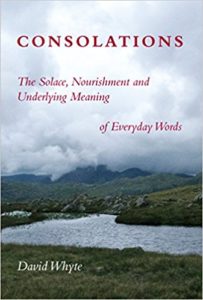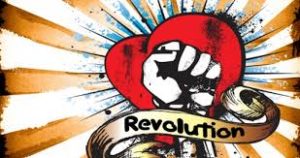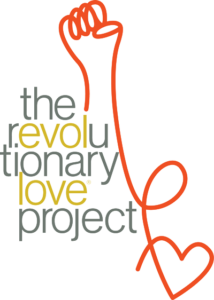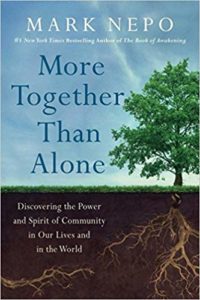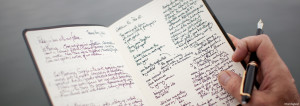Heartbreak
Revolutionary 
July 28, 2018
David Whyte
Heartbreak is unpreventable; the natural outcome of caring for people and things over which we have no control
Heartbreak begins the moment we are asked to let go but cannot, in other words, it colors and inhabits and magnifies each and every day; heartbreak is not a visitation, but a path that human beings follow through even the most average life. Heartbreak is an indication of our sincerity: in a love relationship, in a life’s work, in trying to learn a musical instrument, in the attempt to shape a better more generous self. Heartbreak is the beautifully helpless side of love and affection and is [an] essence and emblem of care… Heartbreak has its own way of inhabiting time and its own beautiful and trying patience in coming and going.
Maria Popova:
“Words belong to each other,” Virginia Woolf asserted in the only surviving recording of her voice. But words also belong to us, as much as we belong to them — and out of that mutual belonging arises our most fundamental understanding of the world, as well as the inescapable misunderstandings that bedevil the grand sensemaking experiment we call life.
David Whyte:
Heartbreak is how we mature; yet we use the word heartbreak as if it only occurs when things have gone wrong: an unrequited love, a shattered dream… But heartbreak may be the very essence of being human, of being on the journey from here to there, and of coming to care deeply for what we find along the way.
[…]
There is almost no path a human being can follow that does not lead to heartbreak.
Then, p. 113-115 in Consolations:
Hiding is a way of staying alive. Hiding is a way of holding ourselves until we are ready to come into the light. Hiding is one of the brilliant and virtuoso practices of almost every part of the natural world: the protective quiet of an icy northern landscape, the held bud of a future summer rose, the snowbound internal pulse of the hibernating bear. Hiding is underestimated. We are hidden by life in our mother’s womb until we grow and ready ourselves for our first appearance in the lighted world; to appear to early in that world is to find ourselves with the immediate necessity for outside intensive care.
Hiding is an act of freedom from the misunderstanding of others, especially in the enclosing world of oppressive secret government and private entities, attempting to name us, to anticipate us, to leave us with no place to hide and grow in ways unmanaged by a creeping necessity for absolution naming, absolute tracking and absolute control. Hiding is a bid for independence from others, from mistaken ideas we have about ourselves, from an oppressive and mistaken wish to keep us completely safe, completely ministered to,and therefor completely managed. Hiding is creative, necessary and beautifully submerse of outside interference and control. Hiding leaves life to itself Hiding is the radical independence necessary four our emergence into the light of a proper human future.
Parker Palmer
p. 161:
Suffering breaks our hearts, but the heart can break in two quite different ways. There’s the brittle heart that breaks into shards, shattering the one who suffers as it explodes, and sometimes taking others down when it’s thrown like a grenade at the ostensible source of its pain. Then there’s the supple heart, the one that breaks open, not apart, the one that can grow into great capacity for the many forms of love. Only the supple heart can hold suffering in a way that opens to new life.
p.39:
We both know that everyone has inner wisdom, and that one of the best ways to evoke it is in dialogue.
p. 161
Does a nation-state have a heart that can become supple enough to respond to collective suffering without violence?[…] I am not going to yield to cynicism. There are enough real-world facts and possibilities to justify hope.
p. 172
Pay attention to what’s right here, right now, and you’ll be rewarded immediately–the Beloved Community is in our midst.
pp. 117-188
Keep reaching out means saying to the world, “I’m still a member of this community. I have a voice and things I need to say, and I want to be part of the conversation.” Seeking Sanctuary is about finding the solace and support we need when our engagement with the rough-and-tumble world of politics starts to cost us our physical and mental well-being. I’m a Quaker. I stand in a religious tradition that asks me to live by such values as community, equality, simplicity, and nonviolence.
Recognize manipulations of
F
E
A
R
“Violence is what happens when we don’t know what to do with our suffering.” [Palmer]
Valarie Kaur is a civil rights activist whose personal lens is colored through feminism and inspired by the Sikh concept of the warrior-saint.
p. 157:
Valarie is redefining and reviving the great tradition of nonviolent action in terms that respond to what Martin Luther kIng Jr. called “The fierce urgency of now.”
Quoting Thomas Merton:
“Loving God is a piece of cake compared to loving another human being. Being human is harder than being holy.”
Revolutionary Love
Declaration of Revolutionary Love:
We declare love even for our opponents. We vow to oppose all executive orders and policies that threaten the rights and dignity of any person. We call upon our elected officials to join us, and we are prepared to engage in moral resistance throughout this administration. We will fight not with violence or vitriol, but by challenging the cultures and institutions that promote hate. In so doing, we will challenge our opponents through the ethic of love.
Thich Nhat Hanh
Enlightenment for a wave is the moment the wave realizes that it is water. At that moment, all fear of death disappears.
Profoundly, grace comes to the wave when it realizes what it is made of. Since it has risen from the very same water into which it will crash its fear of ending is somehow lessened. For it is already a part of where it is going. Can it be that you and I, like simple waves experience such an enlightenment the instant we realize that we are all made of the same water? […] I think now that the other way to read all t his is to say that enlightenment is the moment we realize that we are made of love. At that moment, all fear of living disappears. For grace comes to the heart when it realizes what it is made of and what it has risen from.
-Mark Nepo, The Book Of Awakening
“The ‘Go away’ tribe believes that human beings by nature are self-serving and untrustworthy, in need of control. The ‘Go away’ tribe believes in stringent laws and constraints, both moral and legal, to ensure that people don’t run amok. The ‘Come, teach me’ tribe believes that human beings by nature are kind and trustworthy. The ‘Come, teach’ tribe believes in cultivating laws that empower freedom, to ensure that people actualize their gifts through relationship.
While Mark was a perceptive diagnostician of the modern world, offering insights into the human cost of industrialization. Marx foresaw that capitalism and industrialization break people from their true nature. In time, the modern world alienates from our true selves, which leads to fear and the strident calls of the “Go away’ tribe. Regardless of the type of government we support, there is always the need to repair that brokenness and to restore us to our true nature–from which we rediscover, one more time, that we are more together than alone.”
What we see across the devoid is us. We have created the systems we suffer under.”
Walter Starke
I realized that the spiritualization of our nation’s corporations is the most important development that can possibly happen for the spiritual growth of the the world as a whole.
Heartbreak.
June 30, 2016David Whyte.
Heartbreak is something we feel happens only when things have gone wrong: an unrequited love, a shattered dream, a child lost before their time. Heartbreak is to be avoided; something to guard against, a chasm to watch for and then walk carefully around; the hope is to live without it and to have as little as possible, but all evidence is to the contrary of these child-like hopes; heartbreak is as inescapable and in- evitable as breathing, a part and parcel of every path, asking for its due in every sincere course an individual takes. It may be that there is no real life without the raw revelation of heartbreak; no single path we can take within a life that will allow us to escape without having that imaginative organ we call the heart broken by what it holds and then has to let go.
In a sobering physical sense, every heart does eventually break, as the precipitating reason for death or because the rest of the body has given up before it, but hearts also break in an imaginative and psycho-logical sense: there is almost no path a human being can follow that does not lead to heartbreak. A marriage, a committed vow to another – even the most settled, loving relationship will break our hearts at one time another; parenthood, no matter the sincerity of our love for a child, will always break the mold of our motherly or fatherly hopes; a good work, if taken seriously, will often take everything we have and still leave us wanting; finally even the most self compassionate, self examination should, if we are sincere, lead eventually to existential disappointment.
Realizing its inescapable nature, we can see heartbreak not as the end of the road or the cessation of hope but as the close embrace of the essence of what we have wanted or are about to lose. It is the hidden DNA of our relationship with life, outlining outer forms by the intimate physical experience generated by its absence; it can ground us truly in whatever grief we are experiencing, set us to planting a seed with what we have left or appreciate what we have even as we stand in its ruins. If heartbreak is inevitable and inescapable, it asks us to look for it, to see it as our constant and instructive companion, and perhaps, in the depth of its impact as well as in its hindsight, see it as its own reward. Heartbreak asks us not to look for an alternative path, because there is no alternative path. It is an introduction to what we love and have loved, an inescapable question, something and someone that has been with us all along, asking us to be ready for the ultimate letting go.’

